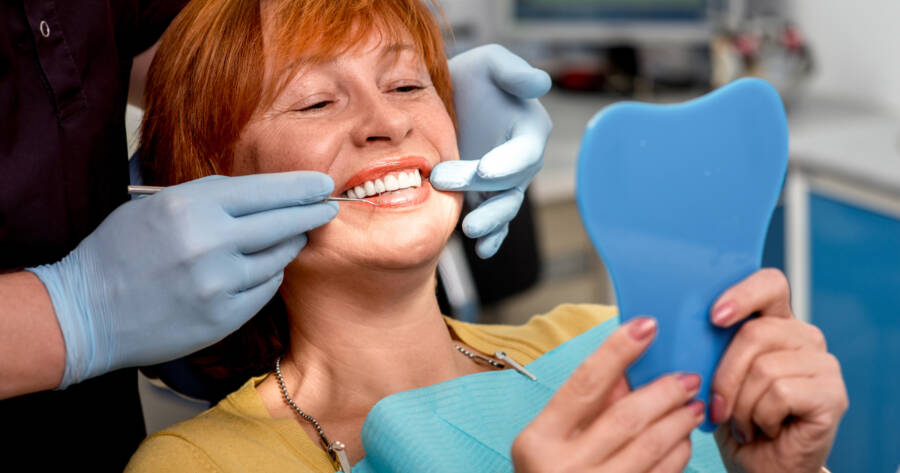Aging brings plenty of challenges, but one of the most surprising can be big changes to your oral health. It’s common for seniors to have missing teeth. Whether you’re dealing with broken, rotting, or lost teeth, these effects of aging can leave you with big gaps in your smile.
And while dentures or bridges might be common solutions for seniors who are missing teeth, they can actually make matters worse. Missing teeth, poorly fitting bridges, and partial or complete dentures can prevent you from eating, sleeping, and enjoying your life.
But there is a solution. Dental implants are a permanent, realistic alternative – and they can replace your missing teeth while also perfecting your smile.
What Are Dental Implants?
Dental implants are replacement teeth. They’re actually very similar to your own natural teeth – they have artificial “roots” that go into your jaw, and they feature crowns that look exactly like real teeth.
More technically, dental implants are titanium implants that are surgically inserted into your jaw. Crowns are then custom-made to perfectly match your natural teeth in shape, size, and color. Over time, the implants fuse with your jawbone, making them as sturdy as any regular tooth.
Currently, dental implants are the strongest and most successful replacement teeth available. They function, feel, and look just like natural teeth – meaning you can eat, talk, and smile normally, with no worries.
Dental Implants Are a Better Solution Than Dentures
While dentures are the most common choice for seniors who are looking to perfect their smiles, they aren’t always the best choice. In fact, dental implants have far more benefits – and positive qualities – than dentures of any kind.
The following are a few of the biggest benefits of choosing dental implants over dentures.
Dental Implants Look and Feel Natural
Dental implants become a natural part of your mouth because they’re surgically implanted into your jaw. Dentures are not; instead, they sit on top of your gums. This means dentures can slip around in your mouth, moving while you’re talking or eating.
And often, dentures are visibly different from natural teeth. Dental implants, however, are designed to match your natural teeth so they blend in seamlessly. You’ll be able to speak, smile, and even laugh naturally, without any worry.
Dental Implants Are a Permanent Solution
Dentures are removable – and in order to use them, you’ll have to remove them daily for cleaning, eating, and a good fit. But this means they aren’t permanent. And typically, you’ll need to have your dentures replaced over time, as frequently as every 5 years. Adding up the cost of a new set of dentures every few years can become more expensive than dental implants.
Dental implants don’t suffer any of these drawbacks. They are never removed, and if cared for properly, they’ll last for many decades. They can last seniors for the rest of their lives.
Dental Implants Will Help Your Oral Health
Missing teeth might not seem like a big health concern, but over time it becomes a serious issue. Leaving gaps in your smile or empty spaces in your mouth can cause your jawbone to deteriorate – and that can change the shape of your face, giving you a more sunken appearance. Unfortunately, dentures can’t do anything to help these effects.
But dental implants can prevent this from happening altogether. Dental implants are the only tooth replacement option that can actually better your overall oral health, stimulating bone growth and preventing bone deterioration. You can preserve your jaw and help your overall health by choosing dental implants.
Dental Implants Can Be Affordable
Many seniors shy away from dental implants because they seem expensive and unaffordable. But the reality is dental implants can actually be within your budget. And they may be cheaper than other alternatives.
The cost of a single implant averages between $1,000 and $3,000. But this is the out-of-pocket price – which means it doesn’t include any help from dental insurance, discount dental plans, or other savings options.
And your dental implants cost will vary. Dental implants are customized for your unique needs, which means you’ll need a consultation with an expert before getting a price estimate. Don’t be afraid to meet with different dentists to see what prices are available to you.
Seniors have a few ways to save money on dental implants. While Medicare doesn’t cover dental implants, you may be able to cut costs if you have a Medigap plan, a Medicare Advantage plan, standard dental insurance, or a dental savings plan. Additionally, there are many dentists who offer financing or payment plans to make dental implants suit your budget.
And when it comes down to dental implants or another option like dentures, dental implants offer long-term benefits that other solutions cannot. Dental implants are the only permanent option – and the only natural-looking and natural-feeling solution. With dental implants, you’ll be able to smile, eat, talk, and live your life normally, with a perfect smile.
 RossHelen / Shutterstock
RossHelen / Shutterstock


